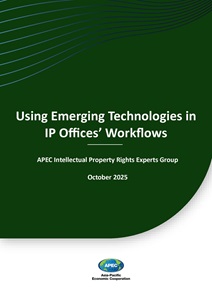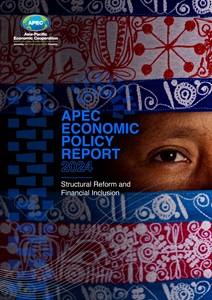
Reports
Using Emerging Technologies in IP Offices’ Workflows
The Asia-Pacific Economic Cooperation (APEC) is a regional economic forum established in 1989 to leverage the growing interdependence of the Asia-Pacific.
The Asia-Pacific Economic Cooperation (APEC) is a regional economic forum established in 1989 to leverage the growing interdependence of the Asia-Pacific.
APEC ensures that goods, services, investment and people move easily across borders. Members facilitate this trade through faster customs procedures at borders; more favorable business climates behind the border; and aligning regulations and standards across the region.
APEC ensures that goods, services, investment and people move easily across borders. Members facilitate this trade through faster customs procedures at borders; more favorable business climates behind the border; and aligning regulations and standards across the region.
APEC works to help all residents of the Asia-Pacific participate in the growing economy.
APEC works to help all residents of the Asia-Pacific participate in the growing economy.
Capacity building projects play an important role in helping translate APEC's goals into reality.
Capacity building projects play an important role in helping translate APEC's goals into reality.

Reports
•November 2024
Download Report
38MB
Published Under
Economic Committee (EC)
Accessed
2467
Pages
130
This year’s APEC Economic Policy Report (AEPR) discusses the crucial topic of Structural Reform and Financial Inclusion, addressing both demand-side and supply-side issues through structural reforms to facilitate all people to access and utilise financial services.
The report highlights that financial inclusion should be a deliberate and deliberative process. Inclusion does not spontaneously happen; it needs to be built in from the start and actively implemented. Even as APEC economies have expanded access to financial services—for example, more than 8 in 10 people in the region have a financial or mobile money account—more can be done to ensure that these services are accessible to all people. From incentivising financial sector competition and innovation to promoting financial literacy and reasonable accommodation practices, structural reform can play an important role in expanding equitable access to quality financial services for all people.

